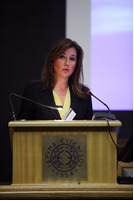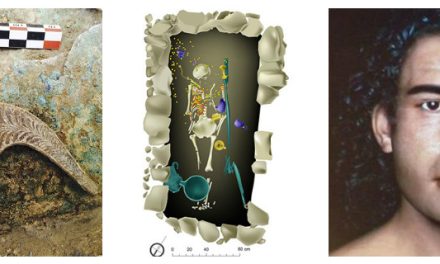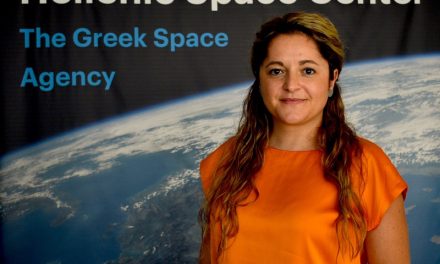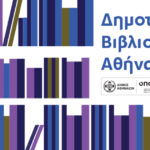Dr. Achillefs Kapanidis is Professor of Biological Physics at the Department of Physics of the University of Oxford. Since the outbreak of the Covid-19 pandemic, Dr. Kapanidis has become known to the wider public, because his team has introduced a new method for coronavirus detection which only takes a few minutes, with a validation accuracy, sensitivity and specificity of more than 90 percent; efforts are now being made for this to be developed into a rapid diagnostic test to detect the coronavirus in respiratory samples.
Born in Thessaloniki, where he also completed his first degree, Achillefs Kapanidis continued his studies abroad and went on to hold research scientist positions at major institutions, eventually becoming a Senior Lecturer (2005) and then Professor (2003) at Oxford University, where he has been leading a group, known as the “Gene Machines” group, which studies machines of gene expression by observing single molecules of gene-expression machinery.
Dr. Kapanidis was interviewed by the Press & Communications Office at the Embassy of Greece in London regarding his team’s groundbreaking advancements in virus detection and his outlook on the Covid-19 pandemic, but also about his experiences living and working abroad and the role Greece still plays in his life.
Could you please introduce yourself to our readers? Tell us please about your studies, your academic and professional trajectory and how you have come to work in the University of Oxford, leading a team that conducts research on Covid-19.
I have been born and raised in Thessaloniki, where I also completed my first degree in Chemistry at the Aristotelian University of Thessaloniki. After completing a Master’s in Food Chemistry at Rutgers University (USA), I received my PhD in Biological Chemistry for work I completed at the Waksman Institute of Microbiology, also at Rutgers. After holding research scientist positions in single-molecule biological physics at Berkeley and UCLA, I became a Senior Lecturer at Oxford University in 2005, and a Professor of Biological Physics in 2013; I have also been a European Research Council (ERC) grant holder and I am currently a Wellcome Trust Investigator.
Since 2005, I have been leading a group of physical and biological scientists (which we informally call the “Gene Machines” group) which studies microbial biological machinery involved in gene expression and regulation, with a focus on gene transcription and DNA repair. Our main tool is advanced fluorescence microscopy based on the observation of single protein and DNA molecules, linked with sophisticated image/data analysis; the past few years, my group has also been working on rapid and ultrasensitive detection of antibiotic resistance and pathogenic viruses, including influenza and coronaviruses.
My work has been published in more than 100 papers and book chapters, as well as in several patent applications. My group has also been pursuing miniaturised single-molecule imaging, a project that culminated my co-founding of the Oxford Nanoimaging spin-out; for these contributions, I was co-awarded the 2019 Innovator of the Year Award from the UK Biotechnology and Biological Sciences Research Council (BBSRC). Finally, I have been involved in the establishment of a new interdisciplinary institute at Oxford (to open in 2021) focusing on using cutting-edge physical approaches to study biological mechanisms in living cells.
How could your team’s research findings contribute to the efforts against Covid-19?
We have been working on understanding the replication mechanisms of the influenza (flu) virus since 2012, and more recently, we have been exploring ways to detect that virus rapidly. In November 2019, we published a method that uses calcium to bind small pieces of fluorescent DNA to enveloped virus particles and to fluorescently label them (Robb et al., Scientific Reports 2019); we can then observe labelled viruses on a sensitive fluorescence microscope, and assess their morphology and size. Our assay is extremely fast (takes just one minute), and works well on respiratory viruses such as influenza and RSV in clinical samples. Notably, the work on the clinical samples was a collaboration with the laboratory of Andreas Mentis at the Hellenic Pasteur Institute in Athens.
When coronavirus emerged in China, we reasoned that our assay should work with the new coronavirus, SARS-CoV-2. We thus obtained permission to continue working despite the closure of our Department, and indeed established that our assay can detect the presence of the virus; part of this work was done in collaboration with the CEMIPAI CNRS Institute at Montpellier, who had access to SARS-CoV-2 in high containment facilities. Further, in work led by an extremely talented graduate student from Cyprus, Nicolas Shiaelis, and Royal Society fellow Dr Nicole Robb, we have introduced a new method for coronavirus detection based on applying machine learning to images of labelled viruses; this method is currently tested on clinical samples in our local hospital. The assay takes only minutes, with a validation accuracy, sensitivity and specificity of >90%. In contrast, the standard virus-detection methods (using the method RT-PCR) requires ~3 hours from the time of swab receipt to result, and for community testing, transport to these facilities adds substantially to the turnaround time.
We are now working with clinicians on turning our method into a rapid and scalable diagnostic test to detect SARS-CoV-2 in respiratory samples. Such a rapid test can have substantial impact, since widespread testing will be absolutely crucial for disease surveillance and control, even if a safe vaccine becomes available in the next 18 months.
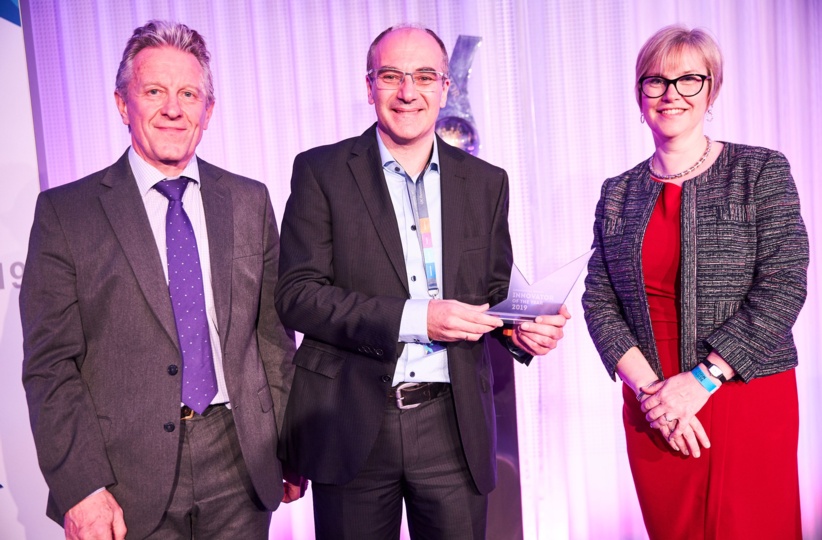 Dr. Kapanidis at the award ceremony of the BBSRC Innovator of the year 2019 award (May 15, 2019)
Dr. Kapanidis at the award ceremony of the BBSRC Innovator of the year 2019 award (May 15, 2019)
Pandemics cause unprecedented, incredible and to a certain extent irreparable social, economic, family and personal disruptions. Are pandemics however welcome by scientific and medical communities, as an opportunity for scientific research, technological advancement, testing of new scientific tools and experimenting on new, cutting-edge medical solutions?
A pandemic is never a welcome development; the devastation that it can cause to societies, families and individuals, and especially to the most vulnerable, is something all scientific and medical community is extremely concerned about. Hence the great efforts of scientists to suppress epidemics and prevent them from escalating into pandemics; the successful containment of the first SARS in 2003, Ebola in 2014, and MERS in 2015 were recent examples of these efforts.
The scientific community is also aware that containment will not always work and that we are never too far away from the next pandemic, so having the scientific tools and organisational structures to address a spreading pathogen is of paramount importance. The need to face pandemics with rapid and decisive action to preserve human life focuses the minds and efforts of the scientists in deploying existing defences against the new virus, in innovating to exploit the vulnerabilities of the microscopic enemy, and in repurposing their work to provide necessary material and intellectual support to other vital activities. International cooperation has also hugely important in our efforts to understand, monitor and control the virus.
There is a sense of duty, public service and social responsibility that drives these contributions, along with the enormous satisfaction of the basic-science researchers to actually see their efforts making a difference in the short term, as opposed to the several years or even decades that it usually takes for fundamental discoveries to translate into tangible societal impact.
Pandemics, as other major events that dramatically reshape human activity, present also opportunities to deliver change for the better. There is no doubt that many of our scientific activities will be transformed for ever after the pandemic, either due to the shifting of our priorities as citizens and scientists, or to avert another ongoing disaster, that of climate change. For example, electronic means for scientists to meet and exchange ideas will help rationalise and minimise global travel for conferences; use of pre-print servers will expand to allow further dissemination of scientific information in a free and rapid manner; and (hopefully) international cooperation and innovation will boost our chances to control climate change.
You have worked also in the USA. How would you compare working in the USA to working in the UK as regards science, scientific research, quick exploitation of the scientific findings and interaction between universities, institutes and the market?
I have spent more than 10 years in the USA in early stages of my career, and this was an experience that shaped much of my approach to science; I was also fortunate to be in the USA during a large expansion of the scientific base and technological development both in academia and industry.
There is no question that US science was and remains extremely strong, powered by large number of research universities and diverse institutes, and there are many aspects to admire and enjoy about it. First and foremost, I enjoyed the vibrant culture of robust and constant questioning and debate about scientific questions and technological challenges (I guessed it satisfied part of my Greek nature!). In such debates, what mattered was whether an idea could survive scientific scrutiny; the status of the persons putting it forward or questioning it was not important. This flattened the hierarchy of “debating societies” and made people realise that they can contribute at any stage of their career, as long as their medium is logical reasoning.
I also liked the fact that the Universities and institutes are full of driven and adventurous young people from all over the world working together; I appreciated the large investment of institutions and the government in basic and applied research, which provided considerable resources to pursue difficult but worthy goals; the opportunity of people to be involved in research from a very young age (e.g., undergraduate research is highly promoted in US research universities); the encouragement of translation of scientific findings into companies and products, that in turn provide high-quality jobs and address societal needs. The PhD was also long enough to allow substantial work to be finished and converted in seminal publications.
On the more negative side, I felt that the overabundance of resources made individuals more wasteful and less focused in their efforts; the time spent in a PhD degree was often way too long, potentially leading to exploitation of some researchers. For academics, the prospect of not achieving tenure (i.e., the ability to stay in their position after very rigorous review) was very stressful and led to loss of work-life balance.
Do you think that Greece is currently in a position -as regards the research infrastructure, the scientific expertise and the human resources- to conduct significant research projects in general, as well as in this specific occasion?
Being away from Greece for a very long time, I can only offer an impression biased from my interactions with colleagues during visits to participate in conferences, from occasional collaboration and participations in reviewing bodies, and from visits to see scientist friends I met in the US and UK.
My impression is that Greece is definitely punching above its weight if you consider the perennial lack of funding and underinvestment in science and technology, and the structural constraints that limit the conduct and administration of science. The country has institutions of excellence such as the Institute of Molecular Biology and Biotechnology (IMBB) in Crete and the Biomedical Research Foundation of the Academy of Athens, where ground-breaking and pioneering advances have been made the past few years, showing that it is possible to perform research at the highest level in Greece, even during enormously challenging times such as the ones brought by the financial crisis of the past decade. However, there is a huge need to support science and technology much further to expand the network of excellent institutions and raise the profile of research in all institutions. Funding should be more extensive and regular, and should complement European funding; returning scientists should be given the resources to start successful labs that attract external funding; entrepreneurship should be encouraged and supported to drive the formation of dynamic spin-out companies in areas where Greece should be leading in innovation. Some of the funding should be strategic and long-term and should not be just the agenda of a single government, but should rise over politics: where can we build on existing strength? Where can we develop local solutions to local problems? Where can we develop our resources in a sustainable way respectful of our environment?
I also take heart from the herculean efforts of the Greek scientific and medical community during the Covid-19 crisis, which had shown that the country can rise to meet this enormous challenge by working in a methodical and committed fashion.
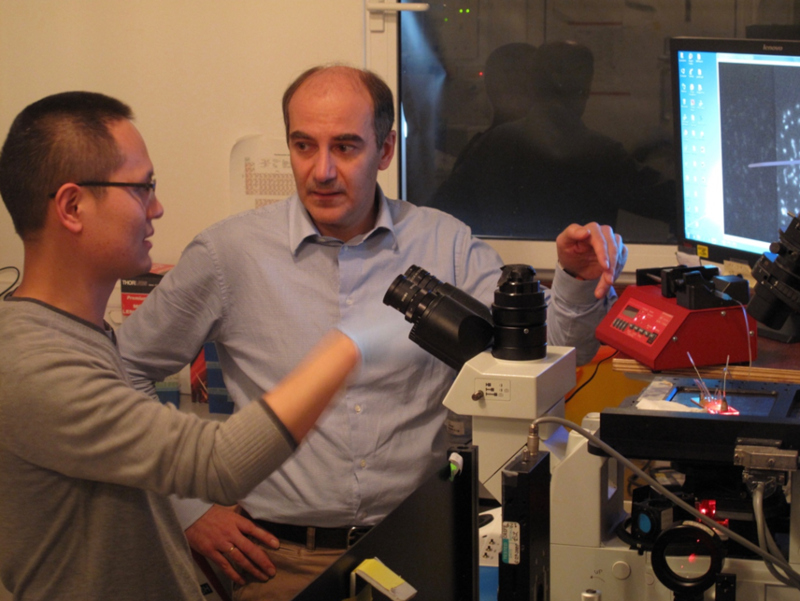 Dr. Achillefs Kapanidis with a collaborating postdoctoral fellow (Photo by Jun Fan)
Dr. Achillefs Kapanidis with a collaborating postdoctoral fellow (Photo by Jun Fan)
What are your personal estimations on the developments for the Covid-19 pandemic? Do you expect a safe vaccine to be produced soon? Do you believe that this virus may trigger other diseases or open new medical and health challenges? Or do you expect that it will soon become another chapter in humanity’s medical history, like for ex. measles, chickenpox and mumps?
As most scientists, I am an optimist, weighing of course the facts and figures in any “guestimate”. Regarding the availability of a safe vaccine, I am optimistic that at least one (and possibly more) will become widely available by the end of 2021, and possibly significantly sooner. For example, the Oxford-led vaccine that is currently in clinical trials is supported by an excellent track record (including the production for vaccines for previous coronaviruses), and there are plans to produce it in billions of doses (even before it is proven to work) to ensure wide availability should the trials prove successful. There are also efforts that use radically new approaches, which may result in pleasant surprises – the important matter here is the diversity of routes to ensure that a few of them will eventually work.
The scale of medical and health challenges associated with the new coronavirus is immense, and uncertainty always forms part of the picture. Since this is a new virus, we don’t know what are the long-term effects of having had the virus and of experiencing a different spectrum of symptoms; we don’t know the effects of the various treatments, as well as any side-effects (long-term or otherwise) that the eventual vaccine will have, and of course we do not know how long any immunity (exposure-induced or vaccine-driven) will last. We will also have to deal with the effect of minimal (or no) health care for non-COVID conditions for an extended period of time, as well as the mental health effects of the lockdown and the “social-distant” world.
This is a traumatic episode in the story of human existence, much as the pandemic of Spanish flu in 1918 and the World Wars – but as with those painful episodes, we will adapt and bounce back, hopefully having have learnt lessons that improve ourselves, our societies, and crucially, our natural environment.
You have lived for many years abroad. What do you miss most about Greece? Is there anything that remains unchanged to a Greek living, even for a long period, abroad?
There are many wonderful things that I miss about Greece, but the most important is family and friends, feeling the warmth of being close to loved ones, experiencing together the joyful moments and being able to help in the difficult moments. Travelling to Greece (when it was straight-forward!) and conferencing technology surely helped keep in touch but there is no substitute for a hug and a relaxed chat over coffee!
What makes more palatable for me living away from Greece is the sizeable and vibrant Greek community at Oxford, which provides some “home” comforts locally. As examples, consider our singing group “Nostos” where for 7 years we sing traditional songs with a modern twist, and our theatre group “Praxis” that has staged 6 plays in modern Greek in the Oxford over the past few years; both efforts are linked with the Oxford University Greek Society. These efforts are in addition to the wonderful and well-attended social and cultural events organised by the Modern Greek Studies Programme of the University, the Greek student communities of both Oxford Universities, and the local Orthodox Church community. Sadly, everything is now on hold due to the pandemic, but we are looking forward to resuming these activities when it is safe to do so.
Living abroad clearly changes one’s attitudes, but I have never felt that my Greek “core” had changed substantially over the years. In fact, being abroad makes you much more aware of your identity and your origins; I believe that the first country you experience when moving away from Greece, is actually Greece itself, since your new home allows you to place your Greek experience in perspective – plus you have to explain to everyone else what the Greek state of mind is and what it is like living in Greece!
Are you optimistic that, in the coming years or decades, there may be a reverse of the brain drain wave that was recorded in Greece in the past decade, or will, in your opinion, the emigration trend continue in the years to come?
I am indeed optimistic but much more needs to be done. There must be a compelling plan in place to attract back Greeks from abroad, and in fact, people who can contribute to the Greek society regardless of their origin. Greece can be a wonderful place to live, and nostalgic Greeks abroad are yearning to make the journey back “home” – but the risks of relocation need to be reduced to see reversal of the trend.
Judging from my experience at Oxford, we are seeing more people returning to Greece nowadays compared to a few years ago; this is a positive trend for Greece which I think will continue, although this may reflect Brexit-related dynamics and not a global trend. The effective and decisive response to pandemic (so far) by Greece can also be a factor, showing that the Greek state can indeed address formidable challenges. The ability of many workers in the digital economy to work remotely may mean that someone can relocate to Greece while working for companies abroad; further, there is a great opportunity to expand this sector in Greece. The government can do much more to attract talented individuals to Greece by helping the formation of new businesses, by providing more funding to attract and promote scientists to its Universities and institutes, and by encouraging the transformation of the industry sector into a more modern, diverse, and fair entity.
Read also via Greek News Agenda:Greek scientific and research community join forces to combat COVID-19; Greek initiatives at the EU vs Virus innovation hackathon to tackle COVID-19; Dr. Androula Nassiopoulou on Nanoscience and Nanotechnology in Greece; Meet “Demokritos” the biggest Research Centre of Greece

